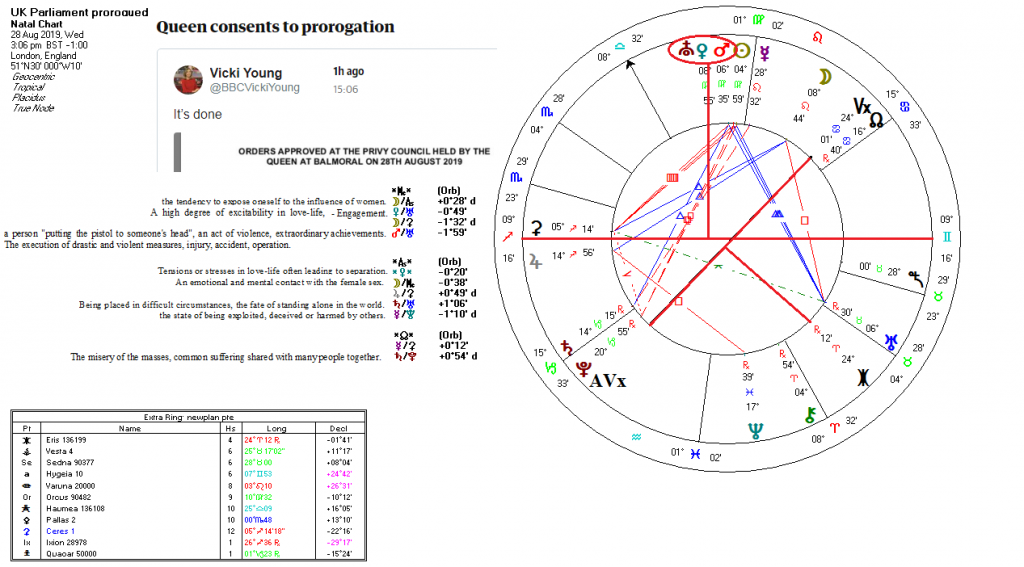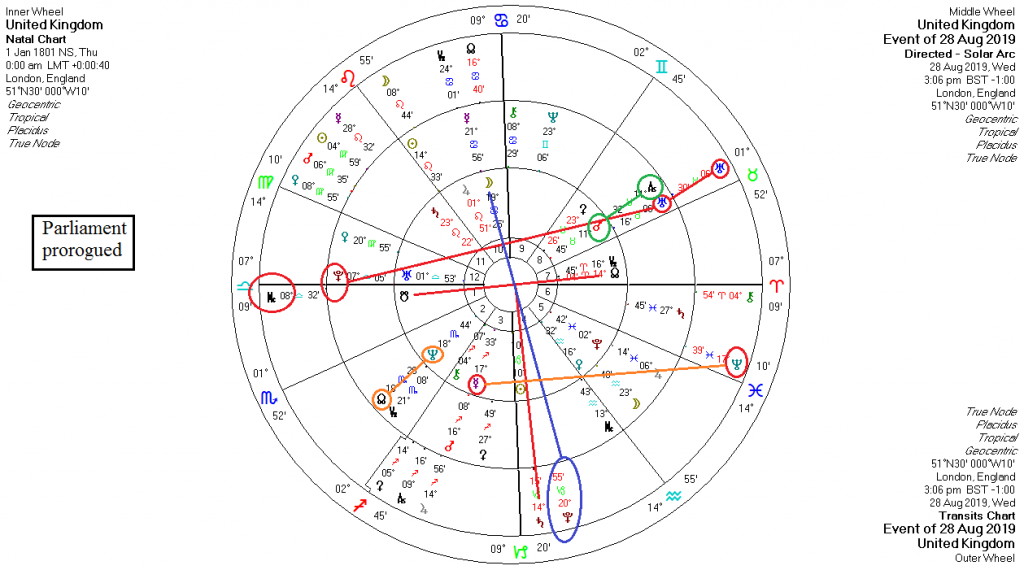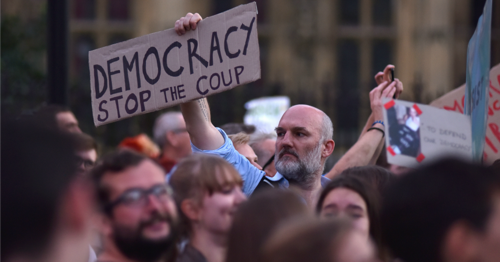Boris Johnson has just played his hand. Probably at the prompting of his chief advisor, Dominic Cummings, he has asked the Queen to prorogue the UK Parliament. She has obliged, dissolving Parliament for five weeks. I have read many sources who say this is likely to result in a no-deal Brexit, much to the delight of many in England and Wales, much to the shock and disgust of Northern Ireland and Scotland – and some in England and Wales, too. It would appear that the Conservatives have finally gotten what they wanted, which is a clean break with the EU, which will also greatly please Donald Trump. I wouldn’t be so certain it will go that way. As the saying goes, it’s not over until…something about a lady singing.
The official announcement from the Queen came yesterday at 15:06 BST (28 Aug 2019). The event chart is below (bigger):

Before we get to the chart, the action is said to be completely within the bounds of British law. The British have no Constitution, but do have a long history of parliamentary democracy. The government can decide to dissolve Parliament (proroguing) after going to the Queen and requesting it. Johnson and Co. are trying to make out that this is somehow not unusual, but in this case it is. The only option to overturn it is to present a case to the High Court, and there are moves to do so. British courts rule by precedent, so we will see in the coming days if there is a basis for a challenge.
It has been reported that team Boris has been holed away at No. 10 since his appointment as PM looking at all sorts of ways to delay Parliament debating Brexit, with that effect that the UK would crash out without a deal on Halloween. These tactics have been likened to a football team wasting time at the end of a match when it knows it will win by doing so. It might be legal, but not very ethical. But then, that’s just politics, right? The British public apparently disagrees.
The delaying tactics include things such as introducing bank holidays, attempting to disrupt a Commons debate on Northern Ireland power-sharing due on Sept. 9, using a variety of mechanisms, including a potential budget, to create new Commons debates and further reduce time for rebels to act, filibustering any bill by rebel MPs attempting to force Johnson to delay Brexit when it reaches the House of Lords, ennobling new pro-Brexit peers as a last resort to kill any such bill in the Lords, and refusing to resign in the event he lost a vote of no confidence. What does the chart say?
In the chart we find a triple conjunction of Venus, Mars and Orcus squaring the horizon. Venus and Orcus form a midpoint, which is very similar to one involving Pluto instead of Orcus. Orcus is a tougher expression than Pluto, and it speaks to the rule of law. Orcus square the horizon by itself in a national figure points to constitutional concerns and the need to adhere to the rule of law, or otherwise face the consequences. There is quite a bit of ‘dancing around the edges’ of the law and the national conscience with this latest move by the Johnson government. We’ll have more on that in a bit.
There are also several key midpoints, shown on the chart, pointing to, among other interpretations: the misery of the masses, ‘putting the pistol to someone’s head’, being placed in difficult circumstances, drastic and violent measures, and so on. In addition, we find Eris square the Vertex axis, throwing discord into the public discourse and giving a vision of the future that is somewhat apocalyptic to those who would like to remain in the EU.
Then, there is Ceres just behind the Ascendant and square the Sun, showing a turning point in the destiny of the Brexit saga. And finally Uranus is trine the Sun, Venus and Mars, showing the element of surprise used successfully to throw off the opposition, Uranus being posited in the 5th house, showing this to be the gamble it is. Boris Johnson is staking his future on the outcome of this action, as are all of his cabinet ministers and advisors. If this goes sour – and anything is possible at this point – Boris may well be seeking a job in journalism once again.
Since the proroguing of Parliament, there has been an online petition to stop the prorogation which went viral, accumulating over a million signatures in the space of a few hours, along with massive protests in the streets. There are also calls now for civil disobedience if Parliament is prorogued. It is not liable to have any effect in the face of Johnson’s cabinet unless the protests are overwhelming, but it shows the dismay of the people over the politics of the current government. Essentially, Boris has seized power, and the event can be likened to a coup, which really goes back to his appointment as PM. Why call it a coup?
The word ‘coup’ has two meanings – the accomplishment of a difficult effort; or the sudden, violent or illegal seizure of power from a government. Johnson’s appointment has elements of both. The Tories finally got the sort of man in place that they wanted to push through Brexit– a man once described as a career psychopath – one Dominic Cummings, with Boris as the figurehead. It is very similar to what we saw in the 2016 US election with the election of Donald Trump and Steve Bannon as his chief advisor. We won’t go into the similarities here. But Johnson was appointed by less than 0.13% of the British public – all Conservatives, all white, all Thatcher-era, racist and male on the whole – and he is not representative of the will of the people. For that to show, the UK would need an election, which may happen.
But just what is the will of the British people? We hear the term “the will of the people” bandied about quite often with Brexit, as if Brexit has been some sacred cow that must be honored if British democracy is to be respected. Well, if we look at the vote in 2016, just to set a record straight and speaking of the four regions of the UK, England voted to leave the EU. That was quite clear: 53% Leave, 47% Remain. That was rural and industrial England. Wales voted in kind, almost exactly. But the UK is not just England and Wales. Scotland voted to remain: 62% to 38%, leaving no doubt. Northern Ireland was similar: 56% to 44%. And London was very close to Scottish sentiments: Remain 60%, to Leave’s 40%. Yes, England and Wales constitute 89% of the UK population, with Northern Ireland at around 3% and Scotland comprising the rest, but this brings up a rather troublesome problem for the Johnson government. And it relates to hard borders.
Boris may not care too much about the 3% in Northern Ireland, but there is serious talk of Irish unification over time if the UK crashes out, which would leave Great Britain – England, Scotland and Wales. There are also been the carrot of a free trade deal with the US if the UK crashes out. But there are around 33 million Irish-Americans who would be none too pleased with the result. They apparently care about the Good Friday Agreement. And some of these Irish Americans hold key positions in trade in the US Congress. They have vowed there will be no free trade agreement with a no-deal Brexit and the re-imposition of a hard border between Ireland and Northern Ireland. With no free trade deal with the US, Boris will have to go hat-in-hand elsewhere.
And of Scotland? The Conservative leader for Scotland, Ruth Davidson, has resigned over this gambit. There has also been talk of another vote for Scottish independence with a no-deal Brexit, which would mean another hard border, this time between England and Scotland. Davidson’s resignation now makes this more likely. Hadrian’s wall revisited, perhaps? If the UK is reduced to England and Wales, that would be around 12% of the British economy gone. And then there is the Queen, with all sorts of speculation about her possible role in the resolution of the crisis the UK now faces.
The Queen has typically tried to stay out of politics. It is one of the keys to her having been able to stay in power for so long. People have long speculated on how she feels about Brexit. On the whole, she is said to be more upset with British politics in its present form than she is about Brexit. She has never really come out and expressed an opinion in public on Brexit. It is not the royal family’s style. She was once famously quoted as asking the question at a dinner, “Give me three good reasons why Britain should be part of Europe”. It was a rhetorical question, meant to invite debate among the dinner guests. It was not a statement. Yet, it was leapt upon at the time in the British press as the Queen being anti-EU. Secret papers from 1988 reveal a different story, however, although opinions can and do change over time.
In the aforementioned papers, from:
“…a diplomatic cable written by Ambassador Rüdiger Freiherr von Wechmar after a meeting with the monarch in 1988 [it] says that the Queen left “no doubt that the future of Britain lies in Europe”. (emphasis added)
Further, giving insights into the Queen’s past thoughts on the EU:
“According to the account, she is said to have noted that many British people did not yet have an understanding of the single market, and said it was “about time” for a government education campaign to explain the union to voters…The account also suggests the monarch was highly critical of then prime minister Margaret Thatcher. When the ambassador suggested that Ms Thatcher seemed to want a different kind of European integration to the one supported by the then German government, the Monarch is said to have replied: “That will change.” After a pause, she added: “If she is still around.” [she was gone two years later]…Discussing Ms Thatcher’s ability to adapt to new political circumstances, the Queen is said to have replied: “Yes, even she has now discovered the hole in the ozone layer.”
Unless things have changed, the Queen will not be drawn into the fray, but if her past views are anything to go by she would be pro-remain. But if the people rise up enough, she may well be the lady who sings at the end of this saga. The reason Thatcher is mentioned here is because it is her economic and social policies, continued under successive Conservative and New Labour governments, that have brought about the current state of dissatisfaction in the public with the current course in which the UK is headed. It has nothing to do with the EU. If Brexit goes ahead, there will be ‘Thatcherism on steroids’ under the Conservatives, with the final death knells to much of what the British have known in the way of social programs and services. Welcome to the US, in other words.
Is the preceding simply scaremongering? Think about it for a moment. If the UK crashes out and is left with no free trade deal with the US (highly likely), then the economy will go into a sharp downturn, possibly for a few years while trade, borders and so on are being renegotiated. If there is a world downturn as well (again, highly likely), that British downturn will be even sharper, deeper and more pronounced. The government will then call for the need to ‘tighten the belt’, cut social spending, sell off state assets, cut taxes (especially to corporations and the wealthy) in order to ‘stimulate the economy’, and on and on.
We have heard all these stories before. The US has been doing this all along since the 1970s, and is getting ready to do the same thing again, talking about the need to cut Social Security in the event of a downturn, for instance, even without the downturn. In the meantime, the need for increased ‘defense’ spending will be put forward to the British public, as necessary to counter ‘emerging threats’ and to ensure ‘the national interests’. But the signs of economic downturn for the British as a result of Brexit are already there. The value of the pound is falling, inflation rose in July, and business investment is flat.
Getting back to why this resembles a coup, then, the astrology may not show in the event chart or Boris Johnson’s administration’s chart – although there are plenty of signs there – but it is definitely there when one looks at the directions and transits to the UK’s chart over the past year, and since Boris has been in office (below, bigger):

The immediate standouts are the directed Pluto almost exact on the UK Ascendant with transiting Uranus quincunx the UK Ascendant/directed Pluto. Further, transiting Pluto is about to enter the 1° orb opposite the UK Moon, ruling the 10th house (sitting government). Pluto rules subterfuge. But that is not all. Transiting Neptune is square the UK Mercury, the latter ruling the UK 9th house (foreign affairs and trade) and 12th house (hidden enemies of the state, secret agendas in general). Neptune rules secretive events, hidden agendas and the 12th house naturally. It also rules fantasy, and square to Mercury we see the fantasies this government undertaking, at best, as well as the outright lies it is promulgating at worst. These would be the same sorts of lies that were sold to the British public during the Brexit campaign.
The progressed Ascendant is on the UK Mars, showing the contentious and inflammatory nature of discourse in the UK now. And lastly, transiting Saturn is at the bending of the UK nodal axis, showing the difficult relationships within the UK and breaks within the same, as well as the directed nodal axis to the UK Neptune, showing a particular karmic destiny of a large group of people – in this case, a nation. At the moment, the UK resembles a flawed democracy.
Boris has made his move, then, and set a clear intention. It was an act of hubris, for which he is known. He won’t have Parliament getting in the way this time, and there are all sorts of contingencies in place in case they try. At least, that is his plan. He is adamant he can win a general election if it comes to that, but even then, the election would take place after the 31st in all likelihood. If that were to be the case, checkmate. He promised he would deliver Brexit, for which he originally campaigned, legality of the same be damned, and at the moment he looks set to be on course to do so. But appearances can be and often are deceiving. There are still two months to go and the resistance is now getting very focused. If a week is a long time in politics, then two months can be an eternity.
The maximum of subterfuge against the British public will be in the next month, when directed Pluto will be exact on the UK Ascendant. After that the planetary factors ease. And then, right at the last days before the deadline, there will be a transit of Jupiter trine the UK Saturn, the latter ruling the 4th house (opposition parties, the people). That is preceded in mid-October by a transit of Mars to the UK Ascendant/directed Pluto, indicating a dangerous and foolish move or event, followed a few days after by the square to the UK Meridian axis. Anything can happen.
This is going to be a nail-biter right to the end. Expect the unexpected. British democracy is going to be tested to its limits in these next two months. But this episode could be the thing that really galvanizes the public in a positive way. Britain is a parliamentary democracy. With no Parliament, there is no representation of the people, no democracy. That is the real situation here. The very thing the Vote Leave group campaigned on — sovereignty — is at threat from a small group of unelected officials, the same ones who barracked for Brexit. It is time for Britons to stand up. Make your voices heard!
Featured pic from Common Dreams

